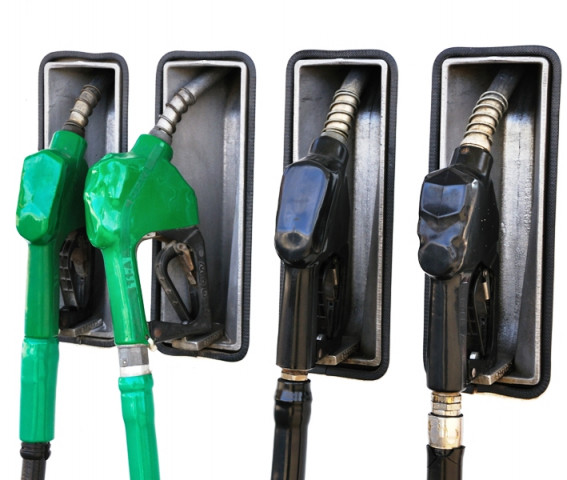Standing firm: ‘If petrol levy is cut, provinces must share the pain’
Federal government refuses to budge on reducing taxes on oil.

Far from giving in to political pressure to cut taxes on petrol, the finance ministry appears to have come up with a tactic to turn the pressure back onto the politicians: the federal government has threatened the provinces with a cut in their share of federal revenues if Islamabad is forced to reduce the petroleum levy.
Sources told The Express Tribune that the federal government was of the view that the provincial governments should not expect Islamabad to take the brunt of reduced revenues as a result of populist pressure. Islamabad expects to share the pain with the provinces, which are expected to take in as much as 70% of the Rs1,952 billion that the Federal Board of Revenue hopes to collect in taxes this fiscal year.
“If Balochistan, Punjab or any of the other provinces want a cut in oil prices, they should share the burden [of the cut] from these resources that [the federal government] transfers to them,” said one finance ministry official who wished to remain anonymous.
Islamabad believes that cutting taxes on petrol will have an inflationary effect, by virtue of the fact that the increase in the fiscal deficit will force the federal government to borrow more money and even outright print a lot, which in turn will cause the purchasing power of the rupee to decline. The finance ministry seems to be in no mood to let that happen.
“We have reduced the inflation rate from 12% to 10% after a lot of struggle,” said the finance ministry official. “If the federal government reduces oil prices by slashing taxes on petroleum products, it will require more borrowing and printing of more currency notes that will cause more inflation across the country.”
For their part, the politicians seem to have lost interest in what appears to be the mathematical impossibility of trying to reduce oil prices while having no impact on the budget deficit. The special National Assembly committee created last week to address this problem was supposed to meet on Wednesday, but only two of its members – Riaz Hussain Pirzada of the PML-Q and Rana Tanvir Hussain of the PML-N – attended. The chairman of the committee, Water and Power Minister Naveed Qamar, did not bother to show up.
One person who did attend the meeting was the recently demoted Abdul Hafeez Shaikh, who served as finance minister until his election to the Senate was invalidated by a Supreme Court decision earlier this month. Shaikh is effectively continuing in his job, but his formal title is now “adviser to the prime minister on finance and revenue.”
Briefing the committee, Shaikh repeated almost the same figures that the finance ministry had submitted during the committee’s last meeting last week. Shaikh said that prices were linked to the global market and the government did not have the power to influence the global commodity trade.
The only notable new item of substance presented to the committee was during the testimony of the Oil and Gas Regulatory Authority (Ogra), when the regulator specified what it expected would be the increases in domestic oil prices during March.
Ogra officials said that petrol prices would rise by about 3.5%, diesel prices by about 1.7%, and kerosene oil by about 2.9%. Petroleum Secretary Ijaz Chaudhry said that the price rises were made inevitable by the sharp rises in international oil prices. Crude oil prices rose to almost $106 per barrel in trading on the New York Mercantile Exchange on Wednesday, up by almost 9.3% since the beginning of the month.
Abdul Sattar, the head of the sales tax division at the FBR, testified that the government had thus far collected about Rs146 billion in general sales tax on petrol, compared to Rs114 billion during the same period last year. The reason behind the 28% rise in revenues appears to be both a rise in consumption as well as a rise in prices.
The government levies a 16% GST on petrol in addition to a petroleum levy of Rs10 per litre on petrol and Rs6.5 per litre on diesel.
Published in The Express Tribune, February 23rd, 2012.



















COMMENTS
Comments are moderated and generally will be posted if they are on-topic and not abusive.
For more information, please see our Comments FAQ